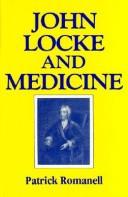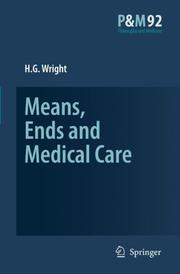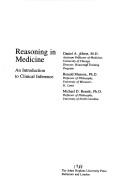| Listing 1 - 10 of 15 | << page >> |
Sort by
|
Book
ISBN: 1283870223 2817803132 Year: 2013 Publisher: Paris : Springer,
Abstract | Keywords | Export | Availability | Bookmark
 Loading...
Loading...Choose an application
- Reference Manager
- EndNote
- RefWorks (Direct export to RefWorks)
Pourquoi les médecins ne suivent-ils pas toujours les recommandations de bonne pratique de la médecine fondée sur les faits (evidence-based medicine) élaborée pour mettre en pratique les progrès issus de la recherche médicale ? Certes, il arrive souvent que la recommandation ne s'applique pas au cas singulier que le médecin doit traiter, mais ce n'est pas toujours le cas : on parle alors d'inertie clinique, phénomène mis en lumière depuis une dizaine d'années et représentant à l'évidence une barrière à l'efficacité des soins et un problème majeur de santé publique dont ce livre montre l'ampleu
Medical logic. --- Clinical reasoning --- Logic, Medical --- Medical reasoning --- Diagnosis --- Medicine --- Philosophy
Book
ISBN: 9782843711459 2843711452 Year: 2011 Publisher: Paris : De Boeck Estem,
Abstract | Keywords | Export | Availability | Bookmark
 Loading...
Loading...Choose an application
- Reference Manager
- EndNote
- RefWorks (Direct export to RefWorks)
Nursing Care --- Education, Nursing --- Nursing --- Soins infirmiers --- Study and teaching --- Examinations, questions etc. --- Textbooks --- Practice --- Etude et enseignement --- Examens, questions, etc. --- Manuels d'enseignement supérieur --- Pratique --- Manuels d'enseignement supérieur --- Nursing Care. --- Education, Nursing. --- Study and teaching. --- Textbooks. --- Nursing assessment --- Nursing Assessment. --- Clinical Reasoning. --- Nursing Diagnosis. --- Soins infirmiers. --- Diagnostic infirmier.
Book
ISBN: 9782343250601 234325060X Year: 2021 Publisher: Paris : L'Harmattan,
Abstract | Keywords | Export | Availability | Bookmark
 Loading...
Loading...Choose an application
- Reference Manager
- EndNote
- RefWorks (Direct export to RefWorks)
Depuis à peine deux ou trois décennies, des éléments successifs sont venus s'interposer entre le patient et son médecin : les différentes machines d'imagerie, les écrans d'ordinateur et puis tout récemment la consultation à distance. Même si les apports technologiques constituent un progrès dans la précision du diagnostic, il n'en reste pas moins qu'une relation médecin-malade de qualité constitue l'élément central d'une médecine qui allie efficacité et humanité. L'objet de ce livre est de tenter de définir les contours renouvelés de cette relation sans méconnaître, par ailleurs, les différentes innovations
Medical personnel and patient. --- Physical diagnosis --- Medical logic. --- Medical innovations --- Medical ethics --- Physician-Patient Relations --- Clinical Reasoning --- Physical Examination --- Relations entre professionnels de santé et patients. --- Relations médecin-patient. --- Relations médecin-patient --- Médecine --- Social aspects. --- Effets des innovations technologiques --- Relations médecin-patient. --- Médecine --- Physician-Patient Relations.

ISBN: 0879752505 Year: 1984 Publisher: Buffalo, N.Y. : Prometheus Books,
Abstract | Keywords | Export | Availability | Bookmark
 Loading...
Loading...Choose an application
- Reference Manager
- EndNote
- RefWorks (Direct export to RefWorks)
Medical logic --- Philosophers --- Physicians --- Logique médicale --- Philosophes --- Médecins --- Biography --- Biographie --- Locke, John, --- Philosophy, Medical. --- Physicians. --- -Philosophers --- -Medical logic --- Clinical reasoning --- Logic, Medical --- Medical reasoning --- Diagnosis --- Medicine --- Scholars --- Allopathic doctors --- Doctors --- Doctors of medicine --- MDs (Physicians) --- Medical doctors --- Medical profession --- Medical personnel --- Physician --- Medical Philosophy --- Philosophy --- England. --- Logique médicale --- Médecins --- Philosophy, Medical --- Locke, John --- Philanthropus, --- Lokk, Dzhon, --- Lūk, Jūn, --- Lo-kʻo, --- Locke, Giovanni, --- Lock, --- Lock, John, --- Rokku, Jon, --- לוק, י׳ון,
Book
Year: 2021 Publisher: Basel, Switzerland MDPI - Multidisciplinary Digital Publishing Institute
Abstract | Keywords | Export | Availability | Bookmark
 Loading...
Loading...Choose an application
- Reference Manager
- EndNote
- RefWorks (Direct export to RefWorks)
Since the conceptualization of bounded rationality, management scholars started investigating how people—managers and entrepreneurs—really make decisions within (and for) organizations. The aim of this eBook is to deeply investigate trends that have flourished within this pivotal research area in conceptual and/or empirical terms, trying to provide new insights on how managers and entrepreneurs make decisions within and for organizations. In this vein, readers that approach this eBook will be taken by hand and accompanied to the discovery of how the mind of decision makers is at the basis of organizational developments or failures. In this regard, published contributions in this eBook underline how executives and entrepreneurs must be ecologically rational, thus be aware of the negative and positive effects that biases can have depending on the context and use them at their advantage. Managerial and entrepreneurial decision-making are phenomena that cannot be detached from the environment in which executives and entrepreneurs are embedded, claiming to establish new approaches to research that looks at decision-making as an individual/group/organization-environment dialectical and multi-level phenomenon.
Business strategy --- Management of specific areas --- behavioral strategy --- decision-making --- core self-evaluations --- intuition --- overconfidence --- performance --- nurse manager --- time pressure --- self-leadership --- stress --- entrepreneurial decision-making --- resource-based view --- opportunity identification --- competitive advantage --- critical assessments --- managerial process --- decision making --- critical infrastructure elements --- resilience --- disruption --- indication --- data lake --- data governance --- data quality --- big data --- digital transformation --- data science --- asset management --- boundary condition --- SME entrepreneurs --- accountants --- cognitive biases --- debiasing --- clinical decision-making process --- clinical reasoning --- orthopaedics --- follow-up decision --- healthcare decision --- n/a
Book
ISBN: 1280938048 9786610938049 1402052162 Year: 2007 Volume: 90 Publisher: Dordrecht : Springer,
Abstract | Keywords | Export | Availability | Bookmark
 Loading...
Loading...Choose an application
- Reference Manager
- EndNote
- RefWorks (Direct export to RefWorks)
Medicine raises numerous philosophical issues. Most discussed have been debates in bioethics. Yet contemporary medicine is also a rich source of controversies and examples that raise important issues in philosophy of science, philosophy of biology, and metaphysics. This volume approaches the philosophy of medicine from the broad naturalist perspective that holds that philosophy must be continuous with, constrained by, and relevant to empirical results of the natural and social sciences and that believes that the history, sociology, politics, and ethics of science provide relevant information for philosophical analysis. One traditional topic covered by several of the contributions is the nature of disease, but the approach is largely from the philosophy of science rather than traditional linguistic analysis. The complex interplay of epistemological and sociological factors in producing evidence in medicine is discussed by chapters on collective medical discussion making, experimental medicine, " genetic" diseases, mental illness, and race and gender categories. The upshot is a volume that ties medicine to contemporary issues in philosophy of science and metaphysics like no other. ‘…An excellent collection of essays in the philosophy of medicine. Whereas most philosophical work about medicine has been concerned with medical ethics, this volume focuses more on key questions in epistemology and metaphysics, although many of these are also relevant to ethical issues. Some of the chapters are among the best I have read in the philosophy of medicine on their respective topics.’ Professor Paul Thagard, Philosophy Department, University of Waterloo, Ontario, Canada.
Medicine --- Medical logic. --- Diseases. --- Philosophy. --- Medical logic --- Human beings --- Illness --- Illnesses --- Morbidity --- Sickness --- Sicknesses --- Epidemiology --- Health --- Pathology --- Sick --- Clinical reasoning --- Logic, Medical --- Medical reasoning --- Diagnosis --- Diseases --- Philosophy --- Medicine. --- Science --- Medicine-Philosophy. --- Metaphysics. --- Social sciences --- Medicine/Public Health, general. --- Philosophy of Science. --- Philosophy of Medicine. --- Philosophy of the Social Sciences. --- Social philosophy --- Social theory --- God --- Ontology --- Philosophy of mind --- Normal science --- Philosophy of science --- Clinical sciences --- Medical profession --- Human biology --- Life sciences --- Medical sciences --- Physicians --- Health Workforce --- Philosophy and science. --- Medicine—Philosophy. --- Philosophy and social sciences. --- Social sciences and philosophy --- Science and philosophy

ISBN: 128085264X 9786610852642 1402052928 140205291X 9048173329 Year: 2007 Volume: 92 Publisher: Dordrecht : Springer,
Abstract | Keywords | Export | Availability | Bookmark
 Loading...
Loading...Choose an application
- Reference Manager
- EndNote
- RefWorks (Direct export to RefWorks)
In this remarkable book, Gary Wright brings his thirty years of experience as a physician in pediatric and family medicine together with his Ph.D. in philosophy to address the important problem of the nature of good medical reasoning. His intimate experiential knowledge of the founding assumptions of managed health care in America today is abundantly evident in his powerful critique of the overly simplistic models of medical judgment that ground most of our health programs. Writing with exceptional clarity, heart-felt compassion for the physical and emotional suffering of patients, and deep philosophical insight into the nature of human cognition, Wright uses the conceptual tools of recent cognitive science to analyze and critique some of the most basic underlying conceptions of contemporary medical care. To make it clear why we desperately need a richer, more nuanced account of medical reasoning, Wright gives a brilliant analysis of the complex internal structure of our concepts of health and disease, showing that our present models are wholly incapable of dealing with the realities of actual human disease. He then shows the error of assuming that we always know in advance what the medical and moral ends are for any medical situation. This leads to a radical questioning of so-called "rational actor" or "economic" models of rationality that are popular in medicine today. However, Wright’s project is not merely critical. More constructively, he draws extensively on empirical research coming out of the cognitive sciences concerning the nature of concepts, reasoning, and judgment, and he then appropriates this research into a broader pragmatist philosophical framework developed by the American philosopher John Dewey. Wright finds in Dewey’s theories of mind, thought, and experience a comprehensive account of human thinking that adequately captures the complexity of actual human conceptualization and reasoning. At the heart of this new view lies an acknowledgment of the central role of imagination and values in all of our thinking. He shows how we actually make sense of our experience by employing cognitive prototypes, metaphorically-defined concepts, radially structured categories, and other processes of imaginative reflection and evaluation. The result of Wright’s alternative view of mind and medical judgment is a practically useful model of medical reasoning that, although not specifiable by a set of fixed rules, can yet give realistic guidance for medical decisions. It is a sensitive model that each of us would want our own physicians to adopt. Prof. Mark Johnson, Department of Philosophy, University of Oregon 'This is one of the best books I have read that addresses Dewey's method of intelligence in the context of practical, including clinical, decision-making. I loved it.' Prof. Griffin Trotter, Center for Health Care Ethics, Saint Louis University, USA .
Medicine --- Medical logic. --- Philosophy. --- Medical logic --- Clinical reasoning --- Logic, Medical --- Medical reasoning --- Diagnosis --- Philosophy --- Medicine-Philosophy. --- Pragmatism. --- Ethics. --- Medical ethics. --- Economic theory. --- Philosophy of Medicine. --- Theory of Medicine/Bioethics. --- Economic Theory/Quantitative Economics/Mathematical Methods. --- Economic theory --- Political economy --- Social sciences --- Economic man --- Biomedical ethics --- Clinical ethics --- Ethics, Medical --- Health care ethics --- Medical care --- Bioethics --- Professional ethics --- Nursing ethics --- Social medicine --- Deontology --- Ethics, Primitive --- Ethology --- Moral philosophy --- Morality --- Morals --- Philosophy, Moral --- Science, Moral --- Values --- Idealism --- Knowledge, Theory of --- Philosophy, Modern --- Positivism --- Realism --- Utilitarianism --- Experience --- Reality --- Truth --- Moral and ethical aspects --- Health Workforce --- Medicine—Philosophy.
Book
ISBN: 8847018927 8847018935 Year: 2011 Publisher: Italy : Springer-Verlag,
Abstract | Keywords | Export | Availability | Bookmark
 Loading...
Loading...Choose an application
- Reference Manager
- EndNote
- RefWorks (Direct export to RefWorks)
Il libro prende le mosse dai pensieri di un giovane che alla maturità liceale si trova affascinato dalla cultura dei classici greco-latini, dai rudimenti filosofici e dall’impatto con le scienze fisiche e naturali. Il latino e i suoi naturalisti hanno suscitato un fervore verso la Botanica Sistematica che lo riporta a Linneo e quindi alla conoscenza del mondo naturale, all’esperienza della denominazione dell’esistente come conoscenza e quindi agli universali di Guglielmo d’Occam. La scelta della facoltà di Medicina fungerà da mediazione fra la filosofia, vista come via alla verità, e la biologia con il grande mistero dell’uomo nella sua dualità di mente/corpo. L’incontro con il microscopio aprirà la strada all’approfondimento della biologia, ma anche alla ricerca dei significati e delle interpretazioni del mondo. I meccanismi della percezione, visiva in particolare, nelle articolazioni della Gestaltpsychologie, e i suoi rapporti con il mondo interiore, sia quello della memoria esplicita che della memoria implicita, sono affrontati nell’esplorazione del mondo attraverso il microscopico e nella ricerca di una obiettività scientifica. Locke e Kant, Popper e Heidegger fanno da contraltare a Ramon y Cajal, Golgi, Kandel, Heisenberg, mentre la semiotica illumina e confonde sull’importanza del linguaggio per la conoscenza. Il segno e il suo riconoscimento si trasferiscono nella scienza attraverso l’inter-soggettività e il linguaggio appare come l’unico modo di penetrare l’esistente. Il libro si dilunga sull’origine di certe denominazioni in patologia tratte dalla vita quotidiana, sull’antropomorfismo spesso applicato agli oggetti del campo microscopico, sempre illustrati su base fenomenologica e psicologica.
Medical microscopy. --- Neurology. --- Neurosciences. --- Biology --- Health & Biological Sciences --- Microscopy --- Medical logic. --- Neural sciences --- Neurological sciences --- Neuroscience --- Clinical reasoning --- Logic, Medical --- Medical reasoning --- Life sciences. --- History. --- Philosophy. --- Pathology. --- Microscopy. --- Psychology. --- Life Sciences. --- Biological Microscopy. --- Psychology, general. --- History of Science. --- Philosophy, general. --- Medical sciences --- Nervous system --- Diagnosis --- Medicine --- Philosophy --- Philosophy (General). --- Disease (Pathology) --- Diseases --- Medicine, Preventive --- Annals --- Auxiliary sciences of history --- Analysis, Microscopic --- Light microscopy --- Micrographic analysis --- Microscope and microscopy --- Microscopic analysis --- Optical microscopy --- Optics --- Mental philosophy --- Humanities --- Behavioral sciences --- Mind --- Science, Mental --- Human biology --- Soul --- Mental health

ISBN: 0801834260 Year: 1988 Publisher: Baltimore : Johns Hopkins University Press,
Abstract | Keywords | Export | Availability | Bookmark
 Loading...
Loading...Choose an application
- Reference Manager
- EndNote
- RefWorks (Direct export to RefWorks)
Decision Making. --- Diagnosis. --- Logic. --- Philosophy, Medical. --- Probability. --- Probabilities --- Medical Philosophy --- Logics --- Antemortem Diagnosis --- Diagnoses and Examinations --- Examinations and Diagnoses --- Postmortem Diagnosis --- Antemortem Diagnoses --- Diagnoses --- Diagnoses, Antemortem --- Diagnoses, Postmortem --- Diagnosis, Antemortem --- Diagnosis, Postmortem --- Postmortem Diagnoses --- Disease --- Decision Making, Shared --- Decision Makings, Shared --- Making, Shared Decision --- Makings, Shared Decision --- Shared Decision Making --- Shared Decision Makings --- Problem Solving --- diagnosis --- Medical logic. --- Clinical medicine --- Decision making. --- Medical logic --- Decision Making --- Diagnosis --- Logic --- Philosophy, Medical --- Probability --- Clinical reasoning --- Logic, Medical --- Medical reasoning --- Medicine --- Decision making --- Philosophy --- Citizen Science --- Diagnose --- Credit Assignment --- Assignment, Credit --- Assignments, Credit --- Credit Assignments
Book
ISBN: 0387963154 1461293731 1461249546 9780387963150 Year: 1986 Publisher: New York
Abstract | Keywords | Export | Availability | Bookmark
 Loading...
Loading...Choose an application
- Reference Manager
- EndNote
- RefWorks (Direct export to RefWorks)
Psychiatry --- Semiology. Diagnosis. Symptomatology --- Medicine --- Medical logic --- Cognition --- DIAGNOSIS --- DECISION MAKING --- Decision making --- Evaluation --- Decision Making. --- Diagnosis. --- -Medicine --- -Clinical sciences --- Medical profession --- Human biology --- Life sciences --- Medical sciences --- Pathology --- Physicians --- Clinical reasoning --- Logic, Medical --- Medical reasoning --- Diagnosis --- Psychology --- Antemortem Diagnosis --- Diagnoses and Examinations --- Examinations and Diagnoses --- Postmortem Diagnosis --- Antemortem Diagnoses --- Diagnoses --- Diagnoses, Antemortem --- Diagnoses, Postmortem --- Diagnosis, Antemortem --- Diagnosis, Postmortem --- Postmortem Diagnoses --- Disease --- Decision Making, Shared --- Decision Makings, Shared --- Making, Shared Decision --- Makings, Shared Decision --- Shared Decision Making --- Shared Decision Makings --- Problem Solving --- -Evaluation --- Philosophy --- diagnosis --- Cognition. --- Medische psychologie --- Evaluation. --- gezondheidspsychologie --- gezondheidspsychologie. --- Decision Making --- Clinical sciences --- Decision making&delete& --- Citizen Science --- Health Workforce --- Diagnose --- Credit Assignment --- Assignment, Credit --- Assignments, Credit --- Credit Assignments --- Medicine - Decision making - Evaluation --- Medical logic - Evaluation
| Listing 1 - 10 of 15 | << page >> |
Sort by
|

 Search
Search Feedback
Feedback About UniCat
About UniCat  Help
Help News
News